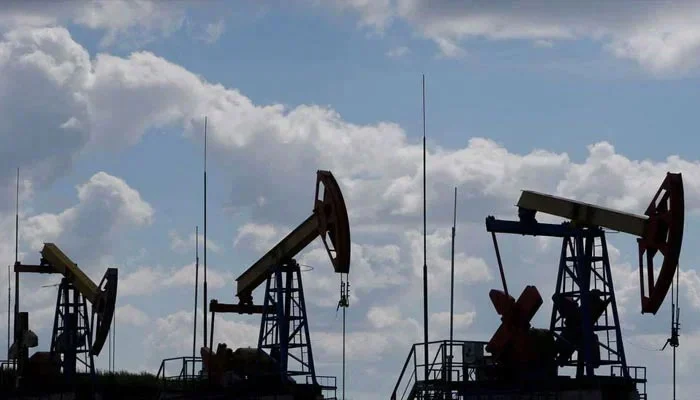- PSO has been nominated on behalf of Pakistan for talks.
- Russia’s PSC has been nominated for the talks by Moscow.
- The PSC delegation arrived in Karachi on Monday.
ISLAMABAD: A Russian technical delegation will hold talks today (Tuesday) with Pakistan State Oil (PSO) officials in Karachi, to give final touches to a crude oil import deal at a government-to-government level (GtG), a senior Energy ministry official told The News.
“In case of successful talks, both the state-owned nominated companies will sign the commercial agreement the next day (March 22),” said the official who spoke on the condition of anonymity.
PSO has been nominated as the state-owned company on behalf of Pakistan for talks and signing of the Russian crude oil import deal. The Operational Services Center (PSC), which is a state-owned company of Russia, has been nominated for the talks by Moscow.
The PSC delegation arrived in Karachi on Monday.
Both the PSC and PSO may ink the deal, as the delegation from Moscow will hold talks on March 21-22.
“The current price of Brent crude has come down to $73 per barrel whereas the Russian crude oil price remained at $52 in February 2023, which has further lowered between $42-48 in the international market,” sources within the industry told the publication.
They urged Pakistan refineries to purchase Russian oil on their own in compliance with the G7 countries’ regulations. However, the government is trying to secure a GtG deal below the $60/barrel price cap imposed by G7 countries.
Under the GtG deal, Petroleum Division wants to lock the deal at close to $50/barrel, $10/barrel below the cap price. The G7 countries had imposed a price cap on Russian oil in the wake of the war on Ukraine.
Some official sources say that Russia wants to confirm if Pakistan really wants to purchase its crude as there is no written direction from Pakistan’s top man to purchase the Russian crude. However, Pakistani officials are exploring options to purchase crude from Moscow under the direction of Pakistan’s prime minister.
“So far Russia has not indicated what discount it will offer.”
The Russian side will finalise with PSO all the prerequisites before inking an agreement that includes the mode of payment, shipping cost with premium, and insurance cost. The officials said that Russia’s PSC may offer a discount on the base price in its talks with the PSO’s technical team.
They added that the shipping of crude oil from Russian ports would take 30 days and an additional per barrel transportation cost would be $10-15/barrel.
The government does not want to divulge the mode of payment to Russia against the import of crude oil. However, the authorities are weighing their options to either use Pakistan National Shipping Corporation ships for transporting crude from the Russian port or to use the Russian tankers.
“We also have to keep in mind the landed cost of Russian crude as the crude vessel will arrive in 30 days, owing to which per barrel shipping cost would hover at $10-15,” the official said, adding that Moscow has not agreed on the discount yet. “We fear that the maximum discount would be offset by the shipping cost of the crude oil.”
However, State Minister for Petroleum Musadik Malik in a televised presser said that Pakistan would get a 30% discount on crude oil prices. Malik, while talking on Geo News programme Capital talk last week, said 80-85% of negotiations with Russia were completed.
“Our commercial deal is in the final stages, and by the month of March the entire commercial deal will be negotiated,” he said. “In April, we will give them the first shipping order. The first cargo of crude oil from Russia will arrive in by the end of April,” the state minister said.
The minister revealed that the country would receive one-third of its crude oil imports from Russia at a concessional rate “the impact of which will be translated to the people.”
“The first crude oil vessel from Russia will arrive at the end of next month of April as a test cargo to assess the landed cost of crude as compared to the cargo Pakistan gets from ADNOC and Saudi Aramco. Pakistan has sought a 30% discount in Russian crude base price.”
In case, the test ship’s cost is found low enough to bring down the prices of petroleum products, Pakistan would give a green signal for the import of Russian oil in a month which may be 2-4 cargos.
Since Pakistan is facing a US dollar liquidity crunch, it would pay Russia in the currencies of friendly countries that include China, Saudi Arabia, and UAE. The officials said that the ship carrying Russian crude will have the NICL’s (National Insurance Company Limited) insurance and Pakistan Reinsurance Company Limited (PakRE) will reinsure the asset (ship with crude oil).
The State Bank of Pakistan, which earlier showed hesitance for any transaction with Russian banks keeping in view the G7 regulations and the US and EU countries, has now shown a willingness to talk with the Russian counter bank over a payment mechanism for oil import in three currencies other than dollars.

 Latest News3 days ago
Latest News3 days ago
 Latest News3 days ago
Latest News3 days ago
 Latest News3 days ago
Latest News3 days ago
 Entertainment3 days ago
Entertainment3 days ago
 Latest News3 days ago
Latest News3 days ago
 Latest News3 days ago
Latest News3 days ago
 Latest News3 days ago
Latest News3 days ago
 Latest News3 days ago
Latest News3 days ago

























